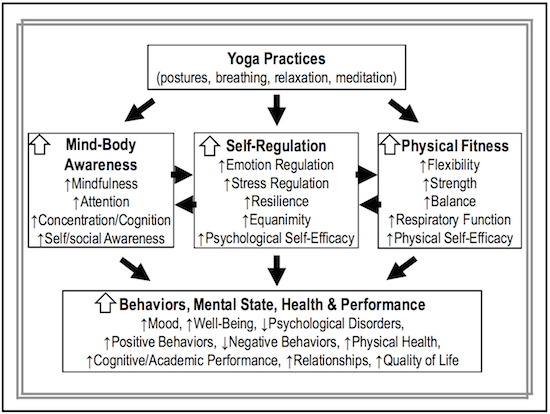I almost titled this post “There’s no place like home,” because I was very happy to get nine hours of sleep in my own bed last night (that said, the beds in the Glenn Hotel were quite comfy, and I wish I could have brought the shower in our room home with us). Another thing I missed while I was at FNCE (besides sleep) was yoga, so that was my top priority this morning (after coffee).
The speakers were registered dietitian nutritionist and yoga teacher Anu (Sandeep) Kaur, MS, RDN, RYT and Dr. Sat Bir Khalsa, PhD, of Harvard Medical School. At their core, Kaur said, yoga and meditation help us cultivate mindfulness. Mindfulness is quite trendy right now, which can obscure it’s true substance.
“If we say that mindfulness is a self-care fad, then we’re really undermining its potency,” she said.
While there are many forms of yoga, and some only focus on the fitness aspects of the practice, the word “yoga” means “union of mind, body and spirt.” More traditional forms of yoga include yogic breathing, which Kaur says can bring you closer to your body and your thoughts.
Dr. Khalsa, author of Your Brain on Yoga, spoke more about the physiological effects of the relaxation response that comes from yoga and meditation practice. He cited a study published last year which found that relaxation response practice enhanced the expression of genes linked to improved cellular function, metabolism, insulin secretion and telomere maintenance. It also reduced the expression of genes linked to chronic inflammation and stress. I don’t know about you, but I would like less inflammation, less stress and healthy cells and telomeres!
In addition to reducing stress, Dr. Khalsa said that regular yoga and meditation practice can help reduce anxiety, improve mood and lessen pain. “Human beings have a remarkable ability for internal self-regulation.”
He also mentioned a 2010 study published in Science magazine (“A Wandering Mind Is An Unhappy Mind“) that found that our minds wander frequently, regardless of what we are doing, and that we are less happy when our minds are wandering than when they are not. In a nutshell, our ability to think about things that are not happening at that moment is a cognitive “achievement” that comes at an emotional cost. Ergo, practices like yoga and meditation that help you be mindful and present in the moment may help you be happier.
I’ll wrap up this post by sharing one of the presentation slides, which gives an overview of how yoga practices can have profound effects on our physical, mental and emotional health (and you don’t have to be a naturally bendy person to practice yoga!):
I should also mention that this talk was moderated by the lovely Annie B. Kay, MS, RD, LDN, RYT, author of the book Every Bite Is Divine. She also has an e-newsletter that I enjoy. You can sign up on her website.







